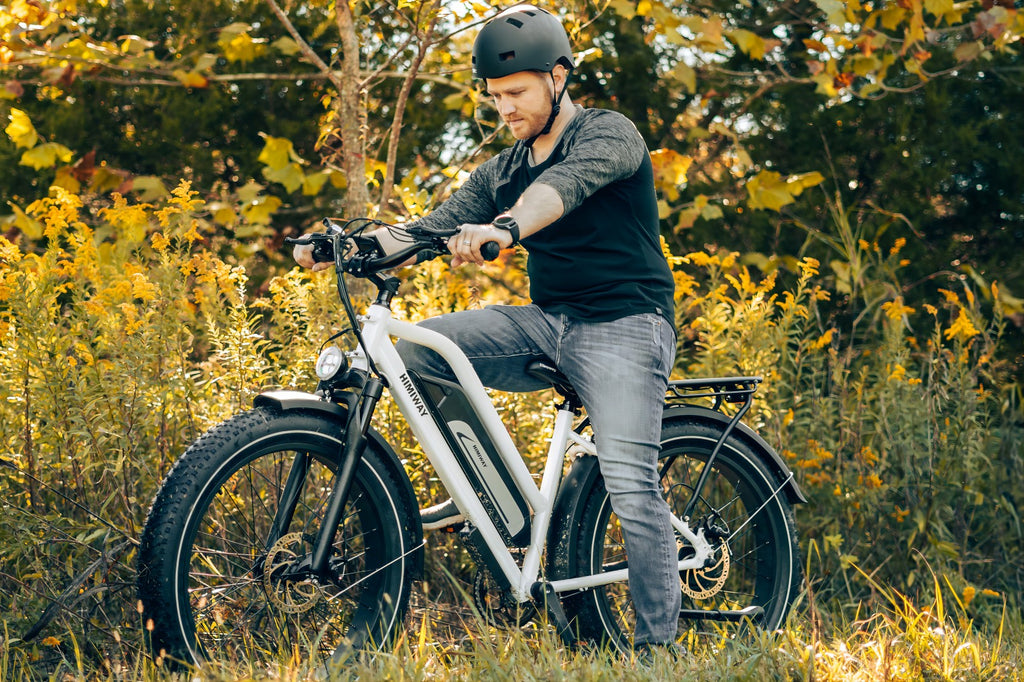As avid electric bike riders, we know how important keeping our batteries in good condition is. After all, healthy batteries mean more time on the trails and less time worrying about running out of power.
Like most of us, this awakens memories of our first time in our new electric fat tire bike for a spin. With all our excitement to explore local trails without worrying about tiredness, low batteries become the top of our worry list after a few hours of riding.
With no intention to cut our rides short, we would make it home unscathed, but not without the need for more conscious efforts towards our bettering e-bike’s battery life. Since we've learned much about charging our electric bike battery to extend its lifespan properly, we're excited to share our tips!

Understanding Electric Fat Tire Bikes and Their Battery Systems
Let us start by ensuring that you understand the intricacies of a typical electric fat tire bike.
Overview of Electric Fat Tire Bikes
Electric fat tire bikes are a type of electric bike with oversized tires. These tires are typically 4 inches wide or more, giving them excellent traction and stability on various surfaces, including sand, snow, mud, and gravel. This makes electric fat tire bikes popular for outdoor enthusiasts who enjoy riding in challenging conditions.
In addition to their off-road capabilities, electric fat tire bikes also offer several other benefits, including:
Enhanced stability:
The wide tires on electric fat tire bikes provide a low center of gravity, which makes them more stable and less likely to tip over. This stability is especially important for riders new to electric bikes or planning on riding on challenging terrain.
Smoother ride:
The wide tires absorb bumps and vibrations more effectively, resulting in a smoother ride, especially for riders with back or joint pain.
Increased comfort:
Electric fat tire bikes typically offer a more comfortable ride than other electric bike types due to their wide tires, plush suspension, and upright riding position.
Versatility:
Electric fat-tire bikes can be used for various activities, including commuting, trail riding, and fat biking. Their versatility makes them a great choice for riders who want a single bike that can do it all.
Battery Systems: The Heart of Your E-Bike
The battery system powers the motor and provides the bike range. It’s the heart of the electric bike and significantly affects its overall performance. Electric fat tire bikes typically use lithium-ion batteries. Lithium-ion batteries are lightweight, energy-dense, and have a long lifespan. They are also relatively maintenance-free, making them a good choice for electric bikes.
The capacity of an electric fat tire bike battery is measured in ampere-hours (Ah). The higher the Ah rating, the longer the bike's range. For example, the Himiway Premium All-terrain Electric Fat Bike Zebra with a Samsung/LG lithium-ion 48V 20Ah battery could travel a range of up to 80 miles. However, you must understand that the range of an electric fat tire bike can also be affected by several other factors, such as the rider's weight, the terrain, and the level of assistance.
When choosing an electric fat tire bike, it’s important to consider the battery system carefully. Choosing a bike with a battery system with enough capacity for your needs would be best. You should also consider the type of battery used and the warranty offered by the manufacturer.

Maximizing Battery Life: Charging Do's and Don'ts
So, how do you thoroughly maximize your ebike’s battery for optimal performance?
Charging Basics: Getting Started
To charge an electric fat tire bike, follow these steps:
1. Turn off the bike.2. Locate the charging port. The charging port is typically located on the battery or the bike's frame near the battery.
3. Plug the electric bike charger into the charging port.
4. Plug the electric bike battery charger into an electrical outlet.
5. The electric bike charger light will turn on to indicate the battery is charging.
6. The electric bike charger light will turn green once the battery is fully charged.
7. Disconnect the charger for electric bike from the electrical outlet and the charging port.
Safety Precautions:
· Always use the charger provided by the manufacturer. Third-party ebike battery chargers may not be compatible with your battery and could damage it.· Charge your battery in a safe location, away from flammable materials.
· Do not overcharge your battery. Overcharging can damage the battery and shorten its lifespan.
· Do not charge your battery in extreme temperatures. Extreme heat or cold can damage the battery.
Ideal Charging Practices for Long Battery Life
Partial charging charges your battery to less than 100%, which is beneficial for battery longevity because it reduces the number of charge cycles. To partially charge your battery, charge it to the level you need for your ride and then disconnect the charger for ebike.
The ideal charging time for your electric fat tire bike battery will vary depending on the capacity of the battery and the charger you are using. However, a general rule of thumb is to charge your battery for 4-6 hours.
It is also important to avoid charging your battery for extended periods. Once the battery is fully charged, disconnect the charger. If you will not be riding your bike for an extended period, storing the battery at a charge of around 50% is best. Avoid storing the battery at a low or full charge, as this can damage the cells.
Avoiding Common Pitfalls: Charging Mistakes to Avoid
Leaving your battery plugged in for extended periods can damage and shorten its lifespan. Once the battery is fully charged, disconnect the charger. Extreme heat or cold can also damage the battery. Therefore, avoid charging your battery in extreme temperatures.
Here are some other charging mistakes to avoid:
· Do not let your battery run out entirely. Aim to keep your battery above 20% charge at all times.· Do not use a damaged charger. If your ebike charger is damaged, replace it immediately.
· Do not charge your battery while it is wet.
Bonus Tip: Power Up on the Go
Portable electric bike chargers can be a lifesaver for longer rides. They allow you to charge your battery while riding or away from a power outlet.
It would be best to use reliable portable chargers compatible with electric fat tire bikes or the chargers that come with your electric bike from purchase. There are several different portable chargers available on the market. When choosing a portable charger, ensure it is compatible with your electric fat tire bike battery.
Maintaining Battery Health: Care and Maintenance Tips
Caring for your electric bike’s battery is not rocket science. And the care you give your e-bike’s battery will tell on the overall health of your e-bike. So, let’s check out some of the best practices in caring for your e-bike’s battery.
Proper Storage: Battery-Friendly Practices
How you store your electric fat tire bike and its battery during inactivity can significantly impact battery lifespan. Here are a few tips for optimal storage:
· Store the battery in a cool, dry place. Avoid storing the battery in direct sunlight or near extreme temperatures.
· Keep the battery at a charge of around 50%. Avoid storing the battery at a low charge or a full charge.
· Check the battery charge every few months and top it off if needed.
Also, keep in mind some of these additional tips for storing your electric fat tire bike:
· Store the bike in a clean, dry place.
· Cover the bike to protect it from dust and moisture.
· Inflate the tires to the recommended pressure.
· Lube the chain and other moving parts.
Regular Inspection: Keeping an Eye on Your Battery
It’s important to regularly inspect your electric fat tire bike battery for any signs of damage or wear. Here is a checklist of key battery components to inspect:
· Battery casing: Look for any cracks, dents, or other signs of damage.· Battery terminals: Ensure the terminals are clean and corrosion-free.
· Battery connector: Make sure the connector is secure and free of damage.
If you notice any signs of damage, contact the manufacturer or a qualified technician immediately. The following are some common battery issues and how to troubleshoot them:
Battery won't charge:
Check the charger and charging port to ensure they work properly. The battery may be damaged if the charger and charging port work properly.
Battery doesn't hold charge:
This could indicate that the battery is aging or damaged. If the battery is new, it may need to be calibrated. To calibrate the battery, fully charge it and then drain it completely. Repeat this process three times.
Battery overheats:
If the battery overheats, stop using it immediately and contact the manufacturer or a qualified technician.
Tire Pressure and Efficiency: Aiding Battery Performance
Tire pressure has a significant impact on rolling resistance and battery efficiency. Proper tire pressure reduces rolling resistance and allows the motor to work more efficiently, improving battery range and performance. The recommended tire pressure for your electric fat tire bike can be found in the owner's manual. Be sure to check your tire pressure regularly and adjust it as needed.
Himiway's Long-Range Electric Fat Tire Bikes: Power and Endurance
Undoubtedly, Himiway long-range electric fat tire bikes have been causing a buzz in the industry for a long time. Let’s check out some of the overwhelming features that make them perfect for all your travel needs.
Introducing Himiway's Long-Range Electric Bikes
HIMIWAY is a trusted brand for long-range electric fat tire bikes. Our bikes are designed to go the distance, with powerful motors and extended battery life. Whether commuting to work, exploring the trails, or running errands around town, the Himiway electric fat tire bike can help you get there effortlessly.
Here are just a few of the features and benefits of HIMIWAY's electric fat tire bikes:
· Extended battery life:
HIMIWAY electric fat tire bikes have high-capacity batteries that provide up to 80 miles of range on a single charge. This means you can ride all day without worrying about running out of power.
· Powerful motors:
HIMIWAY electric fat tire bikes have powerful 750W Geared Hub motors that can easily handle terrains. From steep hills to sandy beaches, our bikes can take you anywhere you want to go.
· All-terrain tires:
HIMIWAY electric fat tire bikes have wide, knobby tires that provide excellent traction and stability on any surface. You can ride your HIMIWAY bike on roads, trails, snow, and sand.
· Comfortable ride:
HIMIWAY electric fat tire bikes are designed to be comfortable to ride, even on long distances. Our bikes feature ergonomic seats, adjustable handlebars, and suspension forks to absorb bumps and vibrations.

Conclusion
This article shares tips and best practices for charging an electric fat tire bike and maintaining battery life. You need to charge your battery, use the bike charger that comes with your bike, and charge regularly, but avoid overcharging it. Especially when it’s not in use, store it in a cool. Checking your tire pressure regularly and avoiding riding your bike in extreme temperatures can also prove helpful in prolonging the lifespan of your battery and maximizing your riding experience.
If you're looking for an electric fat tire bike with long battery life and reliable performance, we highly recommend Himiway bikes. Our bikes are designed to go the distance, so you can confidently explore further and ride longer.














































